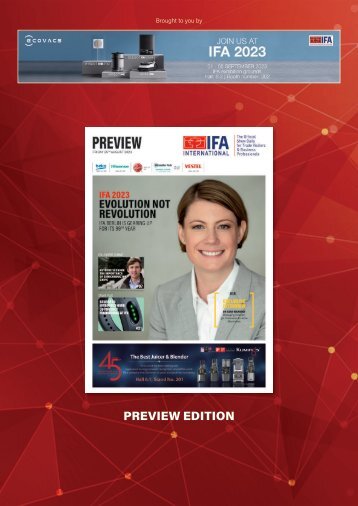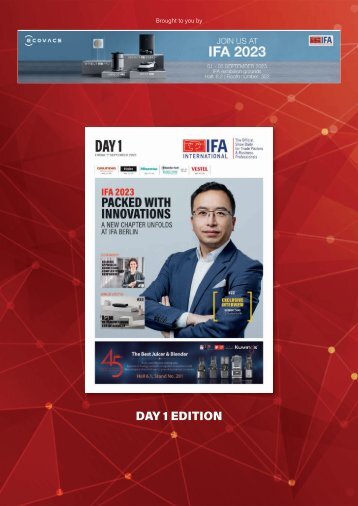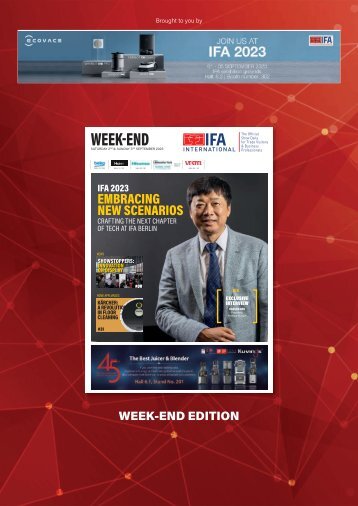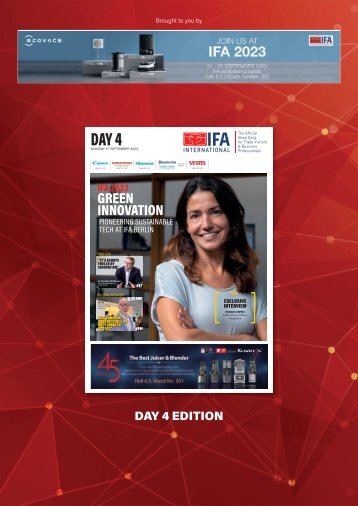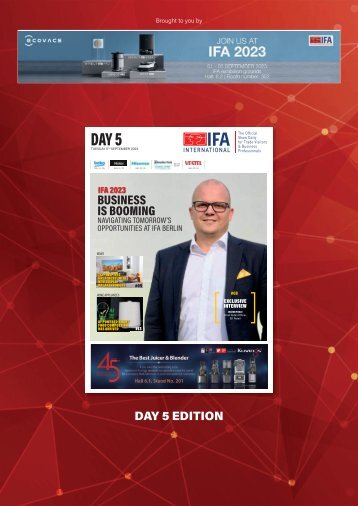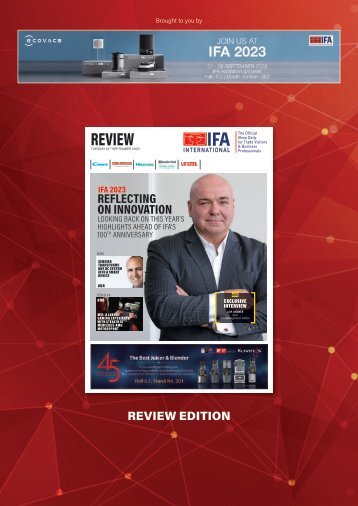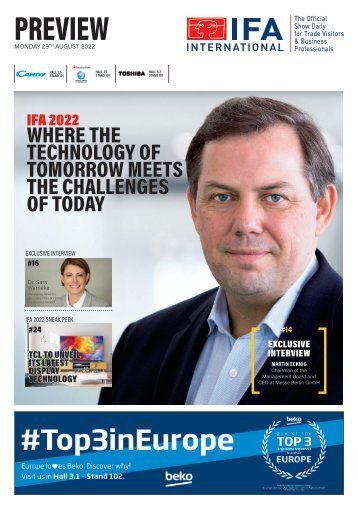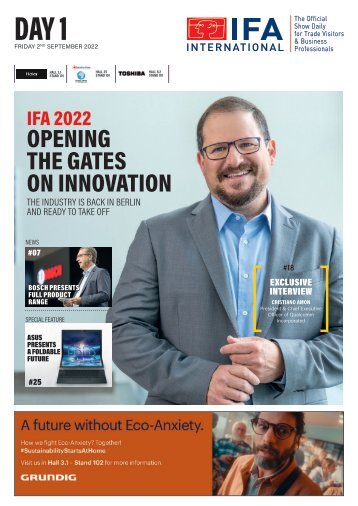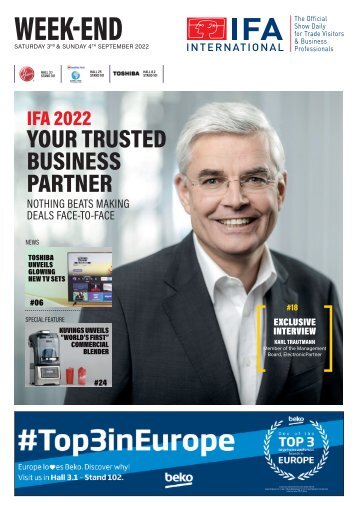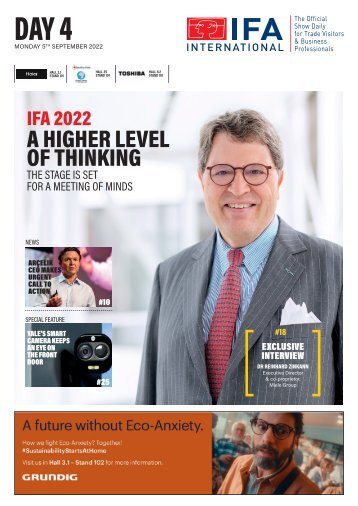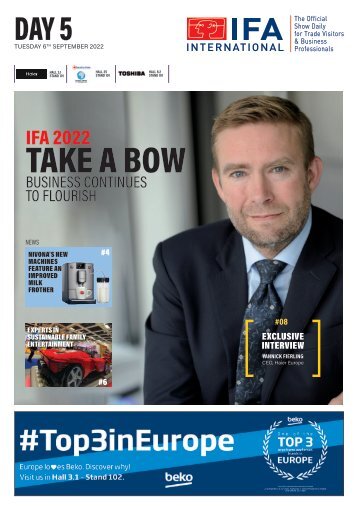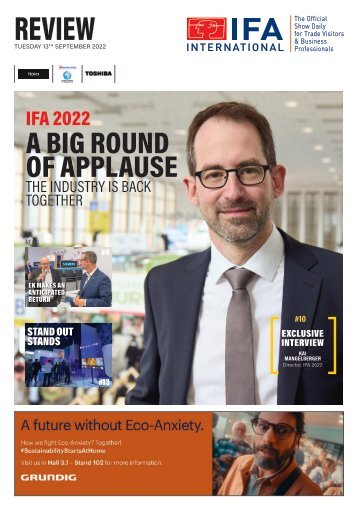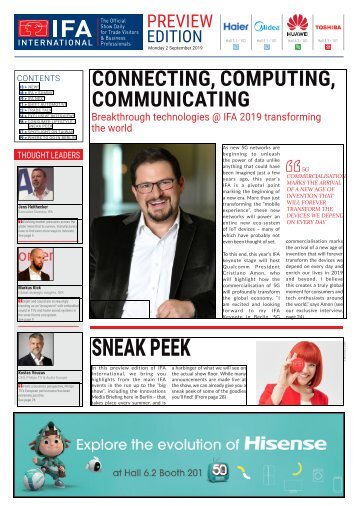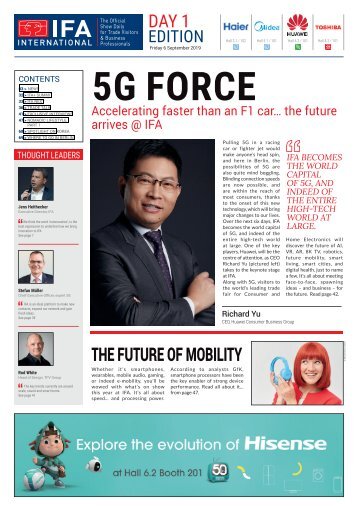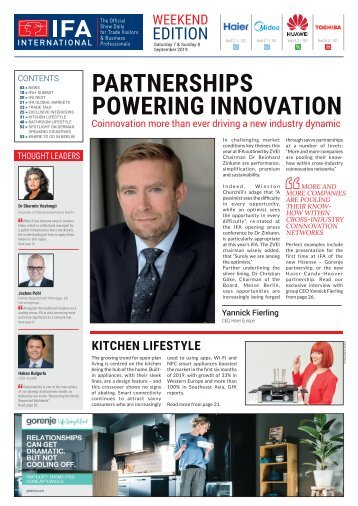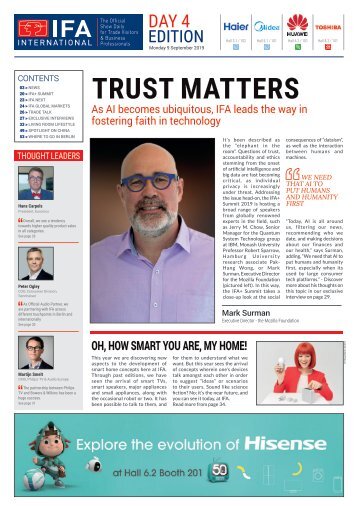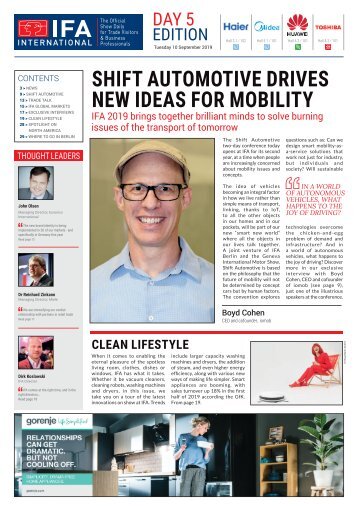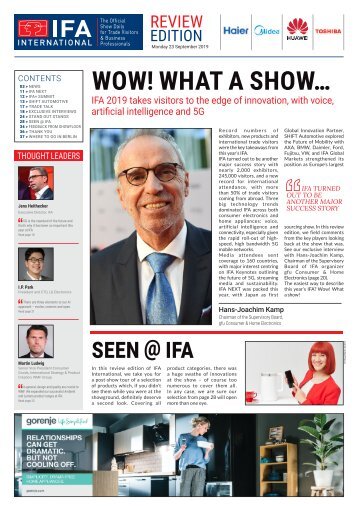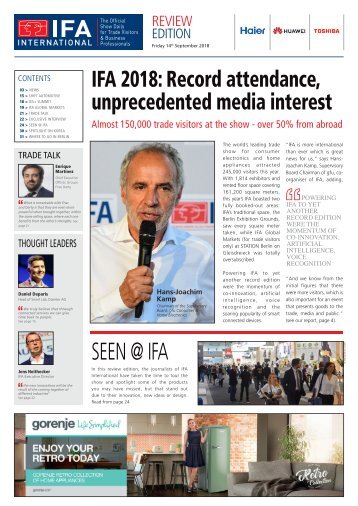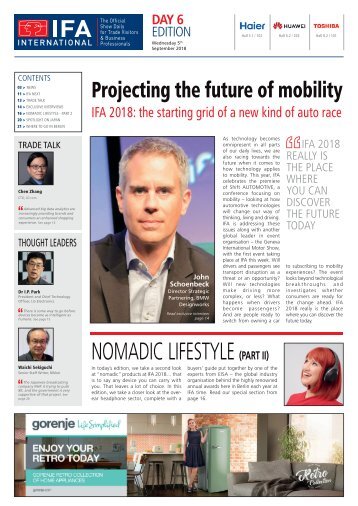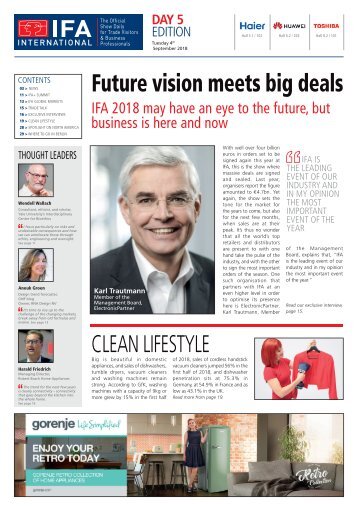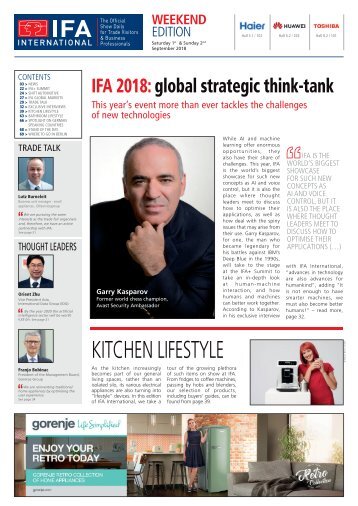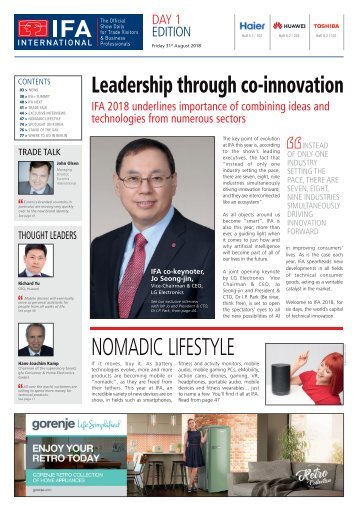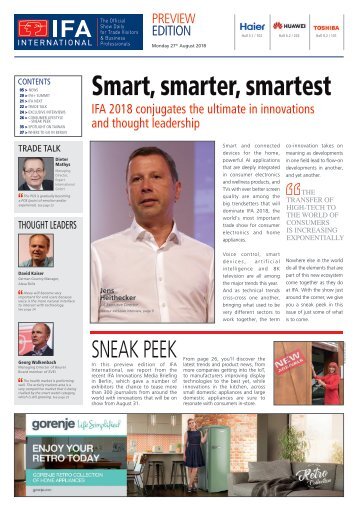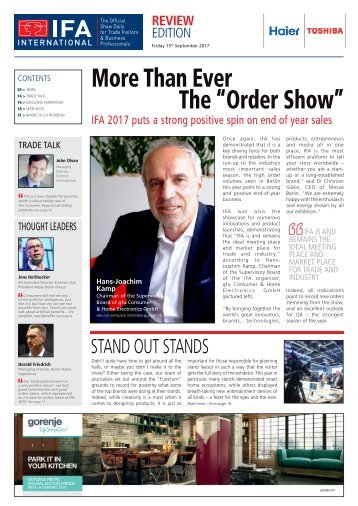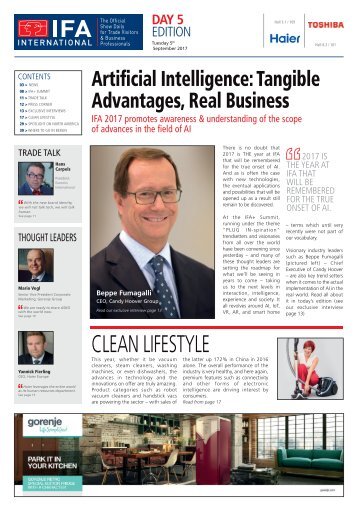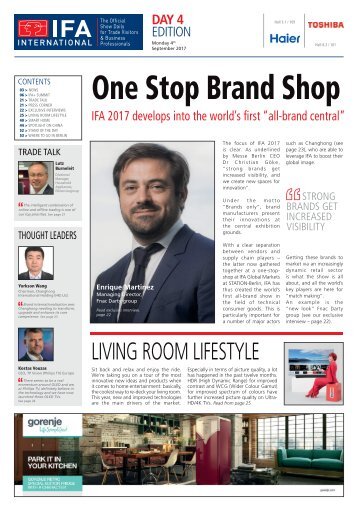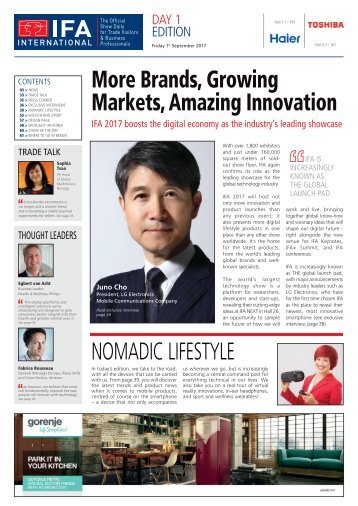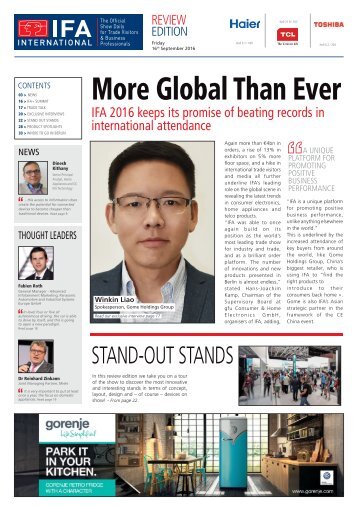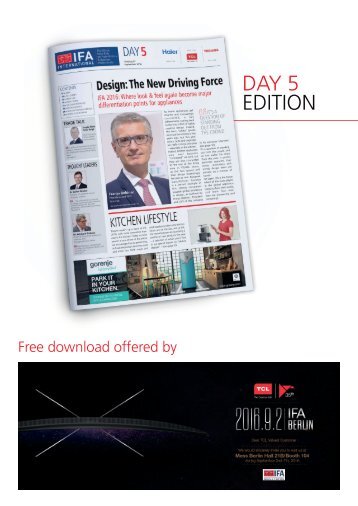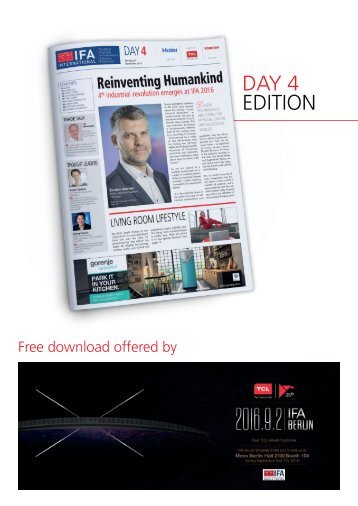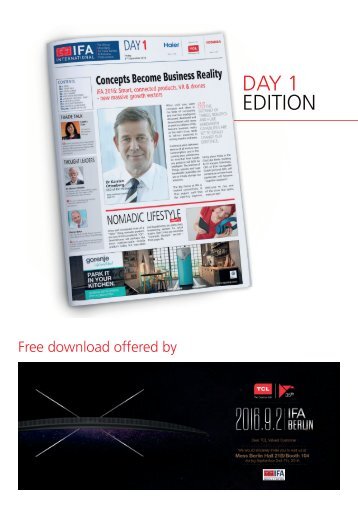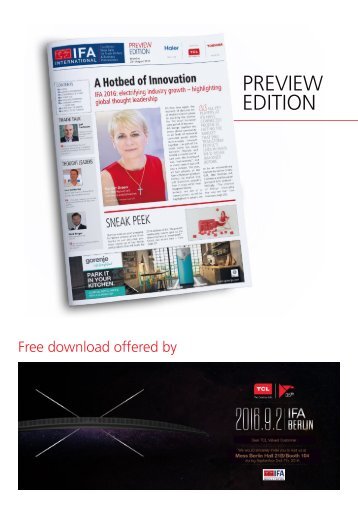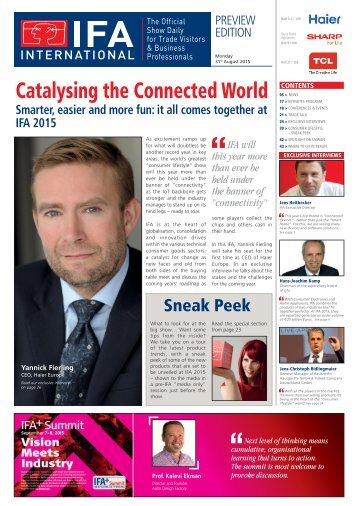
Week-end Edition - Day 2 & 3 - IFA International
- Text
- Appliances
- Products
- Vacuum
- Washing
- Consumer
- September
- Haier
- Digital
- European
- Cordless
©mein-PatrickVedrune
©mein-PatrickVedrune Axelle Lemaire French Minister of State for Digital Affairs Managing the Portfolio Digital future is bright, Axelle Lemaire will tell IFA+Summit French Minister of State for Digital Affairs Axelle Lemaire gives the opening speech at the IFA Summit at 11:00 am on Monday, September 5. In 2012, she was elected to the French National Assembly to represent the French diaspora living in Northern Europe. As the Secretary of the Law Committee and a member of the European Affairs Committee, her main areas of interest were the digital society and digital economy, the protection of human rights and gender equality, and European politics. She refers to her new position as the “portfolio for imagination”… When a French Minister visits Germany, you’d normally expect him or her to talk about Europe. I don’t intend to depart from this practice for the simple reason that the expansion of the digital economy in both our countries is inextricably linked to the existence of this European economic, political and social area that we’ve built together. At present, the digital economy in France represents €113bn in annual added value for our businesses (5.5% of GDP). Between 2010 and 2013, this economy, and its constituent sectors, contributed an average of 13% to French growth. The sector’s growth is driven by household consumption, major public investment in high-speed broadband networks, as well as the emergence of a startup ecosystem unlike any we’ve seen before. Behind the €250m recently raised by OVH – our new unicorn – there’s a whole host of start-ups that are increasingly attracting international investors. In 2015, venture capital investment in our start-ups jumped by 100%, with 484 transactions for a total of €1.8bn, double the amount invested in 2014. We can put this success down to our membership of the EU. Our start-ups now enjoy unfettered access to one of the world’s most thriving markets. This is a vital benefit: Blablacar and Sigfox have become global champions, but only because they were European champions first. Over and above considerations of nationality, start-ups in both our countries are first and foremost European. It’s only natural that entrepreneurs belonging to the Erasmus generation, who plotted out their career paths between France and cities such as Berlin and London, kept international expansion of their businesses in mind from the outset. THERE’S NO DOUBT THAT FRENCH TECH HAS BEEN A GLOWING SUCCESS Today, the development of our start-ups is a truly European issue. As a result, I can but commend the European Commission for having launched, last spring, a major public consultation under the Startup Initiative to get direct feedback from stakeholders. In this respect, to allow the government to reply to the consultation by involving those on the frontline – that’s to 24
OPENING SPEECH CityCube Berlin 5 Sept. 2016 11:00 am say the start-ups themselves – I launched the participatory website europedesstartups.eu. The aim was to aggregate the opinions of French start-ups to provide input for France’s official proposals. In three weeks, we received 400 contributions, over 1,000 votes thanks to 280 participants, and, I believe, played a part in making this major consultation a resounding success. France has been heavily promoting tech companies thanks to the French Tech initiative. Could you tell us more about this and how it’s progressing? The goal of French Tech, that was launched almost three years ago, is to help high-growth startups expand by supporting the emergence and development of ecosystems throughout France. A number of measures have been start-up accelerators in France. I should also mention the French Tech Pass, which is a premium package for companies seeing exponential growth. The latter are provided with customised assistance and help with securing funding and raising their profile. Since it was launched, 114 businesses, including Leechi, Mirakl and Devialet, have received this support. Lastly, the French Tech initiative is geared towards enhancing France’s reach by fostering the arrival of talented individuals and the international expansion of French start-ups: The French Tech Ticket programme boosts France’s international appeal by making it easier for foreign entrepreneurs to set up shop there. These foreign start-ups follow a fast-track procedure for obtaining residence permits, receive financial assistance and are offered spaces in French incubators. Internet hosting company, OVH, which raised €250m this summer and became one of France’s unicorns. Three years on, there’s no doubt that French Tech has been a glowing success. How important is technology as a potential export for France … and on a broader scale, Europe? Today, digital technology is omnipresent and figures in a growing number of export products. It’s also increasingly present in the tertiary sector, which is a breeding ground for start-up innovation. A shining example of the growing contribution of technology to France’s commercial clout is the tremendous success of our country at the most recent Consumer Electronics Shows. In 2015, France stood out with more than 160 companies – promoting and developing technology-based enterprises? I’d like to mention two initiatives. Firstly, the Digital Republic Bill – slated to be enacted in September – which will provide a framework for tomorrow’s economy and foster an open data and knowledge policy by substantially increasing the amount of open government data, and by encouraging the private sector to follow suit. The Bill will establish a climate of trust for everyone. This is vital for the smooth expansion of the digital economy and will be embodied by measures such as platform fairness, the confidentiality of private correspondence, digital data management after death, the right to be forgotten for minors and a new right for individuals to decide how their personal data is communicated and used. of Imagination rolled out to assist our start-up ecosystems in all regions and at all stages of development. The 13 regional ecosystems with most momentum have been awarded French Tech City certification to raise their international visibility and to buttress the expansion of their start-ups. At the same time, we are focusing on organising the ecosystems around strong themes such as #HealthTech, #Fintech and #Foodtech. We’ve also introduced various funding arrangements for startups that are available throughout their development phases. These include French Tech Grants of between €10,000 and €30,000 to support start-ups in their seed phase (over two years, more than 1,000 project leaders have been granted subsidies to the tune of €26m). Start-ups at the acceleration stage are also catered for with the €200m French Tech Acceleration Fund for French Tech Hubs help our start-ups with their international development with support from the vibrant networks of French entrepreneurs aboard. To date, 20 French Tech Hubs have been set up in the world’s major economic centres such as New York, San Francisco, Tokyo, Tel Aviv, Hong Kong, Moscow and Berlin. The final piece of the puzzle is investor confidence, especially that of the top venture capital investors, to ensure that they contribute to the growth of our start-ups. In this regard, the momentum of French Tech has played a telling role in the international promotion of the standard and diversity of the French ecosystem, with convincing results. In 2015, the value of venture capital investments in France doubled to €1.8bn, thus confirming France’s position alongside the UK and Germany as one of the top three most attractive ecosystems. The most recent example is that of the including 66 start-ups – in Eureka Park, accounting for a quarter of all start-ups attending. This year, there were 128 French Tech startups at the CES out of a total of 457, representing almost 30% of worldwide attendance! Looking beyond our borders, one of the key issues for the European economy is integrating digital intelligence into our production facilities. In this respect, we have the Factory of the Future plan in France whilst Germany has embarked on the “Industrie 4.0” initiative. What other initiatives are you encouraging in terms of Secondly, at the end of last year, after having met with every CEO in the CAC 40, I initiated the Open Innovation Alliance to promote open innovation vis-à-vis businesses by uniting a community around shared values shaping a balanced relationship of trust. Using the impetus generated by French Tech, the goal is to contribute to the digital changeover throughout the economy, especially in the most powerful major groups in both France and Germany. The Alliance’s second forum was held last June at VivaTech. The Paris-based event represented a particularly bold move and also helped rally the major groups around the critical question of the digital changeover A KEY ISSUE FOR EUROPE IS INTEGRATING DIGITAL INTELLIGENCE INTO PRODUCTION www.ifa-international.org IFA International • Saturday 3 th & Sunday 4 th September 2016 25
- Page 1 and 2: Free download offered by DAY 2 EDIT
- Page 3: WEEKEND EDITION Hall 21 B / 102 Sat
- Page 7: NEWS From concept to reality: Sieme
- Page 11: NEWS World-Class Audio For ZTE’s
- Page 15 and 16: NEWS Yannick Fierling CEO, Haier Eu
- Page 17 and 18: ADVERTORIAL NEWS Hakan Bulgurlu CEO
- Page 19: NEWS Turkish Appliance Suppliers Te
- Page 22 and 23: NEWS Cordless Vacuums - The New Gro
- Page 24 and 25: NEWS ShowStoppers Unveils Latest Ge
- Page 28 and 29: 26
- Page 30 and 31: EXCLUSIVE INTERVIEW Mark Papermaste
- Page 32 and 33: EXCLUSIVE INTERVIEW © IBM WE ARE U
- Page 34 and 35: 32
- Page 37: CLEAN LIFESTYLE The development in
- Page 40 and 41: BATHROOM LIFESTYLE STEAM PRODUCT SP
- Page 42 and 43: 40
- Page 44 and 45: 42
- Page 46 and 47: BUYERS' GUIDE CLEAN LIFESTYLE WASHI
- Page 48 and 49: BATHROOM LIFESTYLE Hey Good Lookin
- Page 50 and 51: BATHROOM LIFESTYLE BEAUTY & GROOMIN
- Page 52 and 53: Region SPOTLIGHT ON GERMAN SPEAKING
- Page 54 and 55: © Thomas Keller HOSPITALITY / REST
- Page 56 and 57: 54
- Page 59 and 60: HALL PLAN SHUTTLES Hall 3.1 - Stand
- Page 61 and 62: Hall 2.1 - Stand 201 Hall 9 - Stand
Inappropriate
Loading...
Mail this publication
Loading...
Embed
Loading...

IFA International
- IFA International 2023
- IFA International 2022
- IFA International 2020
- IFA International 2019
- IFA International 2018
- IFA International 2017
- IFA International 2016
- IFA International 2015
- IFA International 2014
- IFA International 2013
- IFA International 2012
- IFA International 2011
- IFA International 2010
- IFA International 2009
- IFA International 2008
- IFA International 2007
